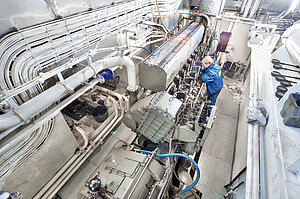The success story of the family-owned company which is headquartered in Spelle in south Emsland began in 1937. What was once a cylinder and crankshaft grinding shop is today one of the largest service providers for combustion engines which works independently of engine manufacturers. The company has over 300 employees. They maintain all types of popular engines within an output range of 100 to 7,000 kWh from stationary energy systems, ships, construction machinery, rolling stock, special-purpose vehicles and industrial plants. In addition, they repair engines, all engine parts, crankshafts, engine blocks, main bearing bores, pumps and gears. The company manages to provide a comprehensive service using their own employees through two branches and 10 support bases. In 2012, a subsidiary company was set up in the Netherlands to serve customers quickly and reliably there as well.
Gas engine operators are only too familiar with the particular challenges that they can face and really value the support they get from the experts at August Storm GmbH & Co. KG. From oil changes to major overhauls, the scope of servicing and repair works is designed in accordance with each partner’s requirements and the situation at hand. The range of services also covers engine replacements and the optimisation of engines, installations and control systems. As a precaution there is always a wide selection of different replacement engines and parts in stock in order to minimise downtime.
The maintenance of gas engines in the sense of preventive maintenance is one of the core competences of August Storm GmbH & Co. KG. The operating company just has to decide whether the scheduled maintenance work should be carried out in accordance with the OEM’s specifications or in accordance with the situation at hand.

For some of the larger CHP plants, August Storm GmbH & Co. KG has installed an online monitoring system and can, if necessary, react extremely quickly. One of the most important elements of condition monitoring is, and has always been, lubricant analytics. Oil samples are regularly taken from all the gas engines that it maintains and sent to the OELCHECK laboratory for testing. If, in exceptional cases, the samples are taken by the operating company itself and analysed by its oil suppliers, the experts from Spelle offer to check the results as a precaution and advise on measures to be taken based on the analysis results and engine history. Thanks to its longstanding relationship with OELCHECK, August Storm GmbH & Co. KG now has its own database with the results of over 1,500 oil analyses. These are used as reference analyses. This way, the company can offer its customers an even more comprehensive service and the best advice possible when it comes to engine oils and their service lives.
The main aim of the analyses is to ensure that the oil is changed only when it needs to be so that the engine oil is used as extensively as possible. Often a stable trend emerges from just a few analyses which means that subsequent analyses are mainly for monitoring purposes and for detecting any changes in the engine’s operating behaviour early. What is important is that the overall picture in an analysis is consistent. If, however, in the case of a particular type of oil just one single warning value shows a strong level of acidification in the lubricant and therefore prompts and early engine oil change, the engine oil’s acid neutralisation capacity will be questioned. If there is a better suited oil for the type of gas, the type of engine and the operating conditions, then a change will be recommended.
When choosing an engine oil and assessing analysis results during operating time, the following should be considered:
In the case of natural gas, contamination from acidic components is lower compared to special gases such as biogas, sewage gas or landfill gas. However, over the last few years, it has become increasingly more common for proportions of various special gases to be mixed in with natural gas when delivered for operations to large CHP plants. These acidic components put considerable strain on engines and oils. If a gas engine oil cannot or can no longer compensate for and neutralise these proportions, natural gas engines, which were able to operate perfectly under clean natural gas operations, can also be heavily affected.
Although some engine manufacturers do not make it a requirement for natural gas, August Storm GmbH & Co. KG take note of the AN (Acid Number or Neutralisation Number), the BN (Base Number) and the initial pH in OELCHECK’s laboratory test results for oils from natural gas engines which have become contaminated with acidic components due to mixing with special gases.
The AN is a measure of the degree of oil acidification. The BN indicates the content of alkaline additives in the oil. It is a significant criterion for determining how many acidic components can still be neutralised and rendered harmless by the oil. Accordingly, the BN should always be higher than the AN.
If an engine oil is loaded with very strong acids, in its laboratory report OELCHECK will also point out the SAN (Strong Acid Number) if it can be measured. In gas engines which operate on biogas or very variable gas qualities, the initial pH provides additional information on the degree of acidification in the gas engine oil.
Conclusion: With the help of OELCHECK analyses, August Storm GmbH & Co. KG has been consistently able to optimise engine oil change intervals and, in doing so, reduce operating costs. By monitoring the trend in the analyses, system faults have often been spotted early so that action could be taken to prevent more serious problems from occurring. And if an engine does suffer some damage, OELCHECK analyses are an important tool for detecting and clarifying the cause.
related links
